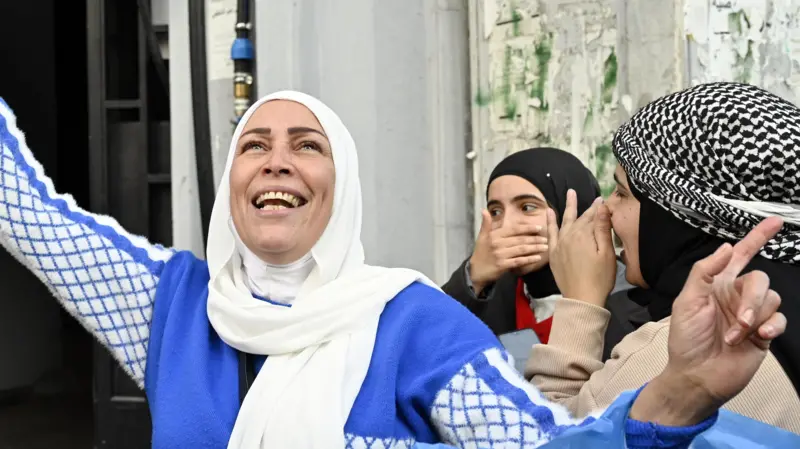Who better than the Syrians to understand the joy of achieving the main objective of a revolution which started in 2011? Who better than them to understand this state of exaltation which reflects the satisfaction of a very large majority of the population who were in favour of a change of regime perhaps unimaginable for some, but which came true, to the great happiness of the Syrians who had no future prospects in a country ravaged by internal wars, and led by an authoritarian regime having favoured crippling economic sanctions, on a Territory which still benefited from the fact that in international relations, the enemy of my enemy, can sometimes be very supportive in a crisis situation to the point of favouring other development prospects which involve military alliances which, in the case of Syria, have favoured the stability of a regime which owes in part its fall to the stagnation of the armed conflict which pits one of its main allies which is an imperialist power, against another State which has been able to resist the humiliating and minimalist expression of special operation, to define what today deserves to be called war, thanks to the remarkable resistance of a people.
The Levant Liberation Organization or Hayat Tahir al-Sham (a former branch of the Al-Qaeda terrorist movement in Syria), put an end to 54 years of a dynasty contested and attacked from all sides, but who managed to stay in power, thanks in particular to an authoritarian regime and even dictatorial for some, which benefited from diplomatic alliances motivated by strategic interests which mock the real problems and demands of the local populations, as long as the regime in place, guarantees the interests of an offensive and oppressive coalition, having maintained a "bloody regime" which is responsible of chemical weapons bombings which, according to medical and humanitarian NGOs, caused the death of more than 2,000 people opposed to the regime, in addition to deaths by torture and hanging which justify accusations of war crimes, and crimes against humanity of a regime which favoured indirect clashes between great powers, in a country already fractured from within by armed groups and other ethnic divisions having powered the rise in tensions which led to a fall which clearly reflects the fact that everything has an end, even if we have to wonder if everything will really be for the best in the long term. Indeed, what the Syrian Observatory for Human Rights (OSDH) describes as “murders, summary executions, and ethnic cleansing operations” following clashes between supporters of the deposed president and those of the security forces of the new power in place raises doubts. The end of the revolution requires pacification of the entire Territory which takes into account respect for the lives of Syrians, whether they are Sunni Muslims, Alawites (supporters of Ali, cousin and son-in-law of the Prophet Mohamed and considered by Shiite Muslims as his worthy heir), Christians, Jews or Kurds.
We cannot talk about lasting peace when hatred of one another continues to claim victims, exactly like the fallen regime. The pacification of the country seems to have taken on the appearance of a phase of settling of accounts, completely out of step with the call for calm and reconciliation advocated by the new interim president. Even if it is a scenario that could be expected, we gain more by choosing reconciliation in spite of everything, rather than revenge. Indeed, The fact that a minority has one of its members in power can be an opportunity for some members of this minority to show others through disrespectful behaviour that they are the ones who run the country, and that they can afford to do what they want, to the point of refusing to submit to people who want to show them the same condescending attitude, after having taken power by force. And even if these internal divisions reflect conflictual relationships that date back and which should not be underestimated, they represent nothing compared to the thousands of Syrians who were on the borders of Syria as soon as the seizure of power by the Levant Liberation Organization was announced. Proof that the fall of the regime, which is the start of a very major project, is a very great relief which augurs maybe good things to come, and in total rupture with the atrocities observed under a previous regime which favoured the development of radical extremism defended by revolutionary movements armed who have never stopped fighting throughout the duration of President Assad’s “dictatorial reign”, with a view to a freedom which will necessarily involve a progressive and imminent pacification of the entire Territory, with a view to a more satisfactory return to an international scene governed certainly by strategic interests, but where respect for the freedoms of individuals and the rule of law are among the main priorities because the real problem is not always the duration of a regime in power, but what has been done concretely for the development of a people who, despite points of view which justify a dissatisfactions, would not have had to destroy very valuable objects belonging to a leader whose excessive comfort, compared to the misery in which the Syrians lived, was unacceptable. Even if we must recognize the reality of the existence of social class scales in all Territories, there are nevertheless contexts where excess luxury, which is not bad in itself, can justify in many ways, the choice to bring down or break with a regime at any cost, so that another takes its place, to give new meaning in particular to the existence of the Syrians.
English|French

